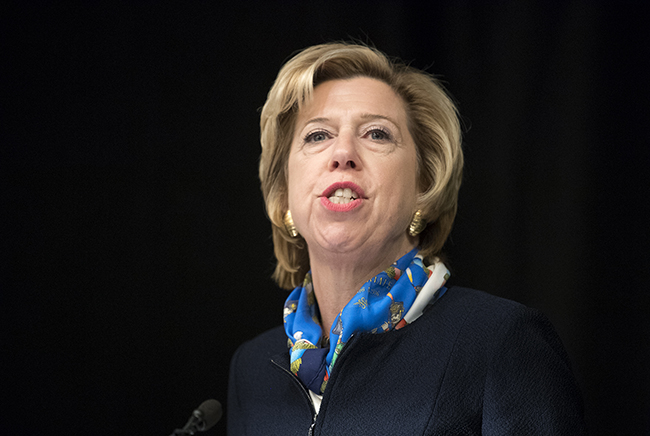
Undersecretary of Defense for Acquisition and Sustainment Ellen Lord speaks during the JEDI Cloud Industry Day in Arlington, Va., on March 7, 2018. DoD photo by EJ Hersom.
The F-35 program will likely experience both schedule delays and cost increases if Turkey is pushed out of the program, but the Pentagon is working on ways to mitigate the potential fallout in that event, Undersecretary of Defense for Acquisition and Sustainment Ellen Lord said in a May 10 press conference.
“We see a potential slowing-down of some deliveries over the next two years” if Turkey is voted out of the F-35 program, Lord said, as well as “some potential cost impacts. But right now we believe we can minimize both of those and are working on refining them.” She said the partners are “very supportive” of the US’ insistence that Turkey drop its plans to buy the Russian S400 Triumf air defense system and instead buy something that is NATO compliant. She said she met with the other JSF partners recently in Brussels, Belgium, at a conference of armaments directors, and they back the US approach.
Turkey is “a very good supplier on the F-35 program,” Lord asserted, noting that partner countries are awarded F-35 supply chain contracts based on value. She said the Pentagon has been looking at alternative supply sources, but expressed hope that a deal can still be made with Turkey that would prevent its departure from the program.
Turkey’s planned purchase of the S400 has roiled both NATO and the JSF partnership, as the US has charged that Russian technicians would gain valuable insight in how to detect and track the F-35 if they were allowed to see the two systems function in close proximity. The Turkish government has rebuffed the US offer of the Patriot air defense system as a substitute for the S400, saying the Triumf sale and delivery is a “done deal” and the system will be delivered this summer. Lord declined to explain Turkey’s objections to the Patriot, saying only, “We’re under discussions right now to replace the S400 with the Patriot.”
Turkey plans to buy 100 F-35s for its air force; the first two are already flying at Luke AFB, Ariz., which is the international training center for all operators of the F-35A version.
President Trump is scheduled to visit Turkey and meet with President Recep Tayyip Erdogan in July, it was announced last week. The two are expected to discuss a number of issues including trade, Middle East security, NATO, and areas of friction between the two countries, such as the S400 deal. The S400 could potentially be delivered during Trump’s visit.
Vice Adm. Mat Winter, the program executive officer for the F-35, in written testimony for the House Armed Services tactical aviation subcommittee last week, said the expected costs of the fighter may not justify going to a multiyear procurement when Lots 15, 16, and 17 come up for negotiation. The JSF partners will be collectively making a multiyear “block buy” in Lots 12, 13, and 14, and it was expected that the US would try to get in on it after full-rate production begins, as US law allows.
Lord said she believes its “premature” to discuss Lots 15, 16, and 17, when negotiations are still underway for Lot 12. She expects to award a contract to Lockheed Martin for Lot 12 in the June-July timeframe.
She offered that she meets with Lockheed Martin CEO Marillyn Hewson on a monthly basis, and credited the company with “working closely with the department, to really understand the cost drivers in the production line.” Lord reported the Pentagon is getting “better and better fidelity” from that data, which, in turn, is allowing the Defense Department to “construct incentive fees around the work that’s being done … to keep the number of aircraft coming off that line consistent with what we need to deliver each year.” The Pentagon and Lockheed are working to drive costs out of the system, she said, and that will get easier with the economies of scale as the annual production rate rises.
Asked if it’s still a goal to enter a multiyear procurement on the F-35, Lord answered, “I’m not sure I would call it a goal. It’s under consideration.” She said there are pluses and minuses to doing a multiyear procurement. “Any decision I will make will be a data-driven decision, and right now, we’re still collecting data,” she said.
Lord said she does not believe the F-35 issue with Turkey is influencing other customers for US foreign military sales in the Middle East. Sales have declined in the last year, but Lord said, “We are in a fairly complicated geo-political environment,” and as a result, some sales will be “questioned a little more within the interagency and Congress, but there is a pent-up demand, obviously.”